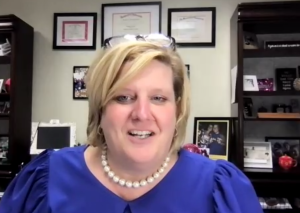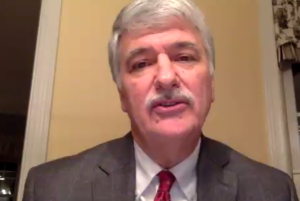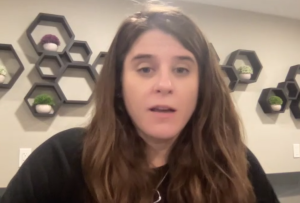From the kindergarten classroom to the high school physics lab, educators across the state shared their biggest challenges, top legislative priorities, and the thing about teaching that still makes them smile in a virtual meeting of nearly 200 CEA members last night. CEA’s first-ever “CountyPalooza” provided a forum for members from more than 70 different school districts to trade ideas about the most pressing issues they’re facing and potential pathways to solving them.

CEA President Kate Dias welcomes educators to the first-ever “CountyPalooza.”
“We have a lot of irons in the fire,” said CEA President Kate Dias, detailing several legislative initiatives CEA is pushing for this session, which range from a pandemic pension credit for teachers to play-based learning in the early grades. “While we’re facing a lot of challenges, there’s a lot to be excited about. We’re seeing great legislative interest in education, and great support. The Education Committee is among the largest in our General Assembly, with more than 40 members.”
One proposal that shows considerable promise—Senate Bill 1: Transparency in Education—would shed light on how school district dollars are being spent, including whether money is going toward adding administrative positions while subtracting teaching and paraeducator positions.
“Are the dollars being spent where they are most valuable, which is the closest to the classroom that you can get?” Dias explained.
Legislators are also interested in various teacher protections in a climate where educators and the profession as a whole are at great risk.
“There is a lot of concern regarding disruptive student behavior not being addressed in a meaningful way,” Dias said. “We are looking at achieving teacher protections through the DCF appeals process. And we are looking at how to ensure teachers are free from intimidation and harassment as we work through our curricula.”

A groundswell of bipartisan support for teachers has resulted from numerous CEA press conferences and communications with lawmakers and members, CEA Executive Director Donald Williams noted.
CEA Executive Director Donald Williams added that CEA—through the work of its Legislative Committee, member surveys, and press conferences—has laid the groundwork for strong bipartisan support for significant infusions of funding to increase teacher salaries, reduce class sizes, provide tuition reimbursement for educators, improve school indoor air quality, and elevate the teaching profession.
“Teacher stress and burnout have never been higher,” Williams said, “and that has been a tremendous wakeup call for legislators.”
He added, “We have to push hard and hold legislators accountable. In our locals, we have to think about how we can energize and engage our colleagues so that when CEA sends Action Alerts on these bills, we have a critical mass of educators contacting legislators to make sure those measures get passed.”

CEA Vice President Joslyn DeLancey updates members on legislative initiatives that show promise for improving teaching and learning conditions.
Educators were especially enthusiastic about initiatives that would improve the teaching and learning environment and create positive social-emotional outcomes for students, including teacher evaluation reform, raising the kindergarten start age, implementation of play-based pedagogy in the early grades, alternative mechanisms for student assessment, and the suspension and eventual repeal of the Foundations of Reading survey required of certified elementary educators. CEA Vice President Joslyn DeLancey explained the various CEA actions—from member surveys to early childhood educator working groups to business items raised during the 2022 CEA Representative Assembly—that led to these proposed measures.
“Legislators are excited about these goals, which is great,” said DeLancey. “Where we are now is the result of teacher voice, and that’s something we can feel very proud of.”
Missed the CountyPalooza? Interested in advocating for change? Join your colleagues on Saturday, February 4, for CEA’s Breakfast with Legislators, where you can meet face-to-face with the elected officials who can move everything from play-based learning to pandemic pension credits forward this legislative session.







